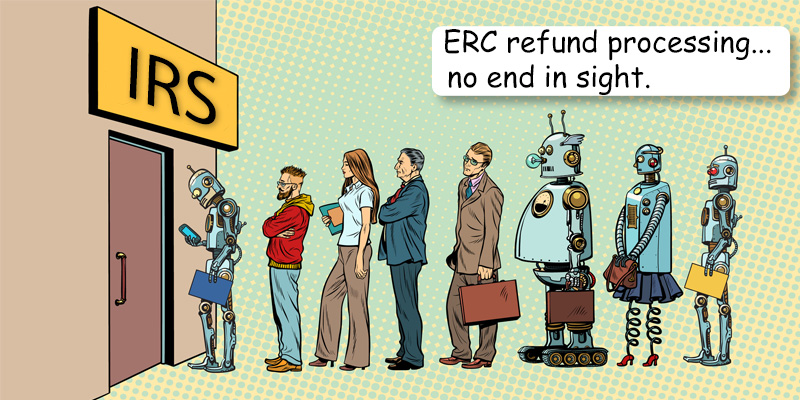Multiple lawsuits have been filed against the IRS, alleging that their lengthy processing time for ERC claims is violating their rights, including one to stop the moratorium that was imposed on new filings made after September 14, 2023. In recent IRS responses to these lawsuits, we have learned new information on how they intend to clear their backlog of 1.4+ million returns they have had as of May 18, 2024. 880,000 of those returns were filed before the moratorium on September 14, 2023, so in essence, the fact there is a moratorium at all, those returns received after that date are way down in the pile, as the IRS processes returns on a first-come, first-served basis.
IRS Deputy Commissioner Douglas O’Donnell made this statement, “Knowing the significant risk of the paper claims in inventory, we will process claims that have the highest risk of ineligibility, looking on a first-in, [sic} first-out basis, [sic} starting with claims filed before the moratorium, by issuing notices of claim disallowance.”
Commissioner O’Donnell’s assertion sounds like they have determined industries or geographical areas that they do not believe were impacted, and would rather reject returns, rather than approve them.
Commissioner O’Donnell further stated, “We will also process claims that have the lowest risk of ineligibility, also looking on a first-in, [sic] first-out basis, [sic} starting with claims filed before the moratorium, by providing either a full allowance or a partial disallowance of the claim. The processing of those claims will occur over the summer. We expect the pace to go slowly and judiciously, [sic} as we continue to refine our analytical tools.”
My interpretation of the latter statement is that once they get through the bulk of returns over the spring that they don’t believe are eligible, that they will then target those they believe are most likely eligible. Again, my guess is based on industry and geographic location. For example, a restaurant in California is more likely to be eligible than a restaurant in Florida during the fourth quarter 2020 and into 2021. Their target of “over the summer” means it is likely that anyone who filed their ERC claim in the spring or summer of 2023 is going to be waiting for over a year for their refund. Any claims filed after the moratorium date, not having anything to do with the fact there is a moratorium but the fact that there are close to one million returns ahead of yours, may not receive a refund for two years.
While this is unfortunate news for those who are waiting, at least it is news that the IRS has a plan. The IRS openly admitted that if an employer is not happy with that timeline, they can file a refund lawsuit. Under section 6532 of the Code, a taxpayer has a statutory right to file a refund lawsuit against the government in federal court if the IRS has: (i) not acted on a refund claim within six months; or (ii) issued a notice of disallowance. A refund lawsuit is costly, and can open the claim and the business to additional scrutiny. If there are lawsuits on a mass scale, considering there are 1.4+ million unprocessed returns, the IRS will be faced with a whole new problem, with a mountain of lawsuit responses which may not actually speed up the process.
There are at least two other options that may be available to shorten the wait: The Taxpayer Advocate Service (TAS,) which may be able to expedite the processing if a hardship can be proven, and companies that will advance, or purchase, outstanding ERC claims. For information on the TAS, you can peruse our our March newsletter. Newsletters can be located on our website under “Resources” if you do not have our email handy. The other option is the existence of companies that will provide an advance or even purchase the pending credit. Shop around as rates vary, and it could be a way to guarantee seeing the funds in a few weeks opposed to a year, or even years from now.
Here are some recent statistics posted by the IRS the other week:
- Since September 2023, the past nine months, the agency has processed 42,000 returns, of which they denied 14,000. That’s 28,000 returns processed in nine months.
- The IRS continues to receive approximately 70,000 new returns each month.
At those rates, there is literally no end in sight, so hopefully there are drastic changes coming at some point in the future.
While we make every attempt to ensure the accuracy and reliability of the information provided in this document, the information is provided “as-is” without warranty of any kind. Romeo Chicco or PayMaster, Inc does not accept any responsibility or liability for the accuracy, content, completeness, legality, or reliability of the information contained. Consult with your CPA, Attorney, and/or HR Professional as federal, state, and local laws change frequently.

